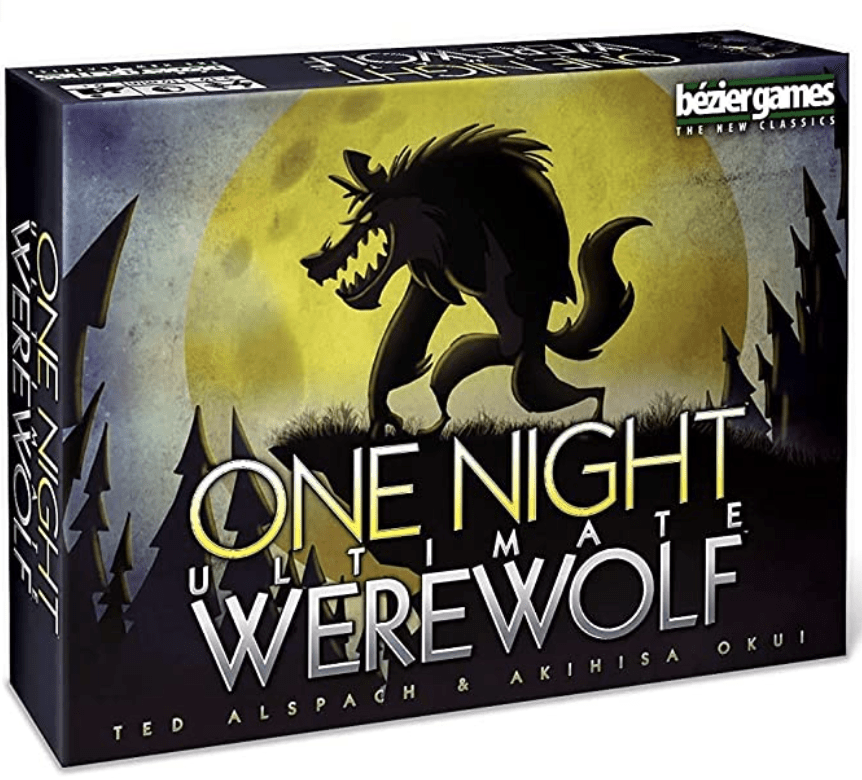Name of game: One Night Ultimate Werewolf
Creator: Ted Alspach
Platform: physical board game supported by phone app
Target audience: the box says it is for 9+ years old but from personal experience it feels more like 14+ since the game is quite complex. I would say that the main target audience is young people.
Formal elements of the game:
The number of players is 3 to 10, with 7 being the best number in my opinion because it makes for good diversity of roles and not overwhelming complexity.
For each round, the players are dealt a card which is their secret role. Each player is either on the Werewolves or Villagers team. Most players have special roles, which they can perform at night. For example, the Seer can check one player’s card, the Troublemaker can swap two players’ cards, the Doppelgänger can take up the role of another player, etc. During the day, the goal of players on the Villagers team is to figure out who the Werewolves are, while the goal of the Werewolves is to stay uncovered. One interesting aspect of the game is that no one can be really sure who they are, since their cards might have been swapped, robbed, etc. Hence, the game creates player dynamics and objectives that keep shifting as new pieces of information are revealed by each player. After 5 minutes, players need to vote on who they think the Werewolves are. If one Werewolf gets caught, then the Villagers team wins. If no Werewolf gets caught, the Werewolves team wins.

The game creates different types of fun. In my opinion, it is mostly about fantasy (players pretend to be certain roles), narrative (a story is created by the actions of each player) and fellowship (players get to discuss with each other during the game). The combination of those types of fun really sell the game by making it appealing to different types of people. There is also a lot of fun derived from lying to your friends and trying to figure out who is lying. Another design component of the game that makes it really fun for everyone is that the rounds are really short (about 10 minutes long). If you don’t like your role, you only have to play that role for 10 minutes. Furthermore, every action happens over one round (one night). Players do not get eliminated over several rounds and hence everyone is always playing. Besides, the phone app that accompanies the game makes it possible such that there is no need for any player to be the moderator.
One thing that could be improved about the game is making it simpler for new players. If one is new to the game, they have to memorize all the 7-8 special roles and that is very overwhelming to keep track of. One way could be having some recommended setup for beginners, e.g. fewer complicated special roles in play. Another way is to have the description of the role also written on the corresponding card, so that one does not have to look suspicious by reading some part of the reference guide to understand their role. The sequence in which the players do their action overnight is also important, hence there could be a quick reference for that on the board to further avoid cognitive overload. All these improvements would enable new players to think less about the rules and procedures, but instead focus more on the game.
One aspect that differentiates the game from others in its genre (e.g. Avalon, Secret Hitler, Mafia, etc) is that every action happens overnight and there is a timed discussion during the day, which as mentioned earlier, makes the game go faster (10 minutes). This makes it better. However, because it is so fast-paced and there are so many special roles involved, this makes it overwhelming for new players and less appropriate as some sort of party game. I also think that the strategies in One Night Ultimate Werewolf are harder to figure out than those in other similar games, which makes the game better or worse depending on whether you are a just a casual board game player or a hardcore board game player.
In this game, no players really need to get vulnerable since they are assigned roles that are unrelated to the players’ identity. This makes it hard to create deeper connections / friendships between players, although it can get conversations going in groups of friends or strangers since most of the game revolves around those discussions.



